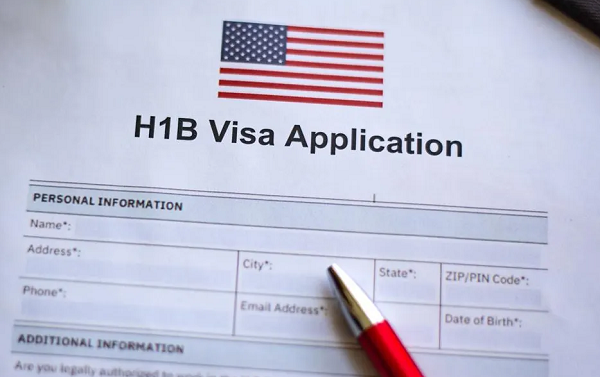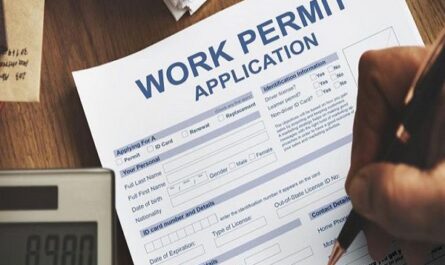The US H-1B Visa is a non-immigrant visa category that allows highly skilled foreign workers to temporarily work in the United States. This visa program is designed to attract professionals with specialized knowledge and expertise in fields such as information technology, engineering, healthcare, finance, and more. The H-1B visa is sought after by both employers in the United States and foreign nationals who wish to advance their careers in the country.
One of the key features of the H-1B visa is its focus on attracting individuals with specific skills and qualifications that are in high demand in the US job market. To be eligible for this visa, applicants typically need to have at least a bachelor’s degree or its equivalent, and their job roles must be in specialized fields that require such qualifications.
The H-1B visa application process involves an employer sponsoring the foreign worker. This means that a US-based company must offer a job to the applicant and file a petition on their behalf with the United States Citizenship and Immigration Services (USCIS). If approved, the visa allows the foreign worker to reside and work in the United States for a specified period, usually up to three years, with the possibility of extension.
H-1B visa holders contribute significantly to the US workforce, filling gaps in industries where there may be a shortage of qualified professionals. However, the H-1B program has been the subject of debate and reform efforts over the years, as it is limited by an annual cap on the number of visas issued, and there are concerns about its impact on the domestic job market.
In this lengthy post, we will be dishing out everything you need to know about the US H-1B Visa, so let’s get started…
Requirements To Apply For US H1B Visa
To apply for a U.S. H-1B visa, which is a non-immigrant visa that allows foreign workers in specialty occupations to work in the United States, there are several requirements and steps you need to follow. Here are the key requirements:
Job Offer:
You must have a job offer from a U.S. employer who is willing to sponsor your H-1B visa. The job must be in a specialty occupation that typically requires at least a bachelor’s degree or its equivalent.
Specialty Occupation:
Your job must qualify as a specialty occupation. This typically includes roles in fields such as IT, engineering, science, medicine, and others that require specialized knowledge and skills.
Educational Qualifications:
You must have the necessary educational qualifications for the job. This generally means at least a bachelor’s degree or its equivalent. The degree should be relevant to the position.
Labor Condition Application (LCA):
Your employer must file an LCA with the U.S. Department of Labor. The LCA includes details about the job, such as the wage, location, and working conditions, to ensure that hiring you will not negatively impact U.S. workers.
Employer Sponsorship:
Your U.S. employer is responsible for sponsoring your H-1B visa. They will file a Form I-129 (Petition for a Nonimmigrant Worker) with U.S. Citizenship and Immigration Services (USCIS).
Cap Limits:
H-1B visas are subject to an annual cap, which limits the number of new visas that can be issued each fiscal year. There are exceptions for certain employers and categories, such as those working for universities or research institutions.
Lottery System:
If the number of H-1B petitions exceeds the annual cap, a lottery system is used to select the recipients. USCIS randomly selects petitions to meet the quota.
Duration:
H-1B visas are typically granted for an initial period of three years, with the possibility of extension for up to a total of six years.
Dependents:
H-1B visa holders can bring their immediate family members (spouse and unmarried children under 21) to the United States on H-4 visas. H-4 visa holders are not authorized to work in the U.S., except under certain circumstances.
Maintain Status:
It’s essential to maintain your legal status while in the U.S. Your employer should provide you with the necessary conditions and support to ensure you remain in compliance with your visa terms.
Visa Interview:
Once your H-1B petition is approved, you’ll need to schedule a visa interview at the U.S. embassy or consulate in your home country.
Visa Application Fee:
You’ll need to pay the required visa application fee and complete the DS-160 online visa application form.
Supporting Documents:
During your visa interview, you’ll need to provide various documents, including your passport, visa application form, visa fee receipt, the approved Form I-129, and any other documents requested by the consular officer.
Documents Needed To Apply For US H1B Visa
To apply for a U.S. H-1B visa, you will need to gather a variety of documents and information. The H-1B visa is a non-immigrant visa that allows foreign workers in specialty occupations to work in the United States for a specified period. Here are the key documents and requirements you’ll need for the H-1B visa application:
Job Offer Letter:
You’ll need a job offer from a U.S. employer who is willing to sponsor you for an H-1B visa. The offer should outline your job responsibilities, salary, and other employment terms.
Labor Condition Application (LCA):
Your employer must file an LCA with the U.S. Department of Labor (DOL) before submitting the H-1B petition. The LCA certifies that the employment of foreign workers will not negatively impact the working conditions of U.S. workers. You’ll need the LCA number for your H-1B application.
Form DS-160:
Complete the online Nonimmigrant Visa Application (Form DS-160) on the U.S. Department of State’s Consular Electronic Application Center (CEAC) website.
H-1B Petition:
Your U.S. employer must file an H-1B petition (Form I-129) with U.S. Citizenship and Immigration Services (USCIS). This petition includes various forms and supporting documents, such as:
- Form I-129 (Petition for a Nonimmigrant Worker)
- Support letter from the employer
- Copy of the job offer
- Employment contract or agreement
- Educational and professional qualifications documentation
- Evidence of the employer’s ability to pay your salary
- If applicable, documents demonstrating the specialty nature of the occupation
- Any other supporting documents requested by USCIS
- Visa Application Fee: Pay the non-refundable visa application fee.
ACWIA Fee:
In certain cases, your employer may need to pay the American Competitiveness and Workforce Improvement Act (ACWIA) fee.
Public Access File:
Your employer is required to maintain a public access file containing certain H-1B-related documents, which must be available for public inspection.
Passport:
Your passport must be valid for at least six months beyond your intended period of stay in the United States.
Passport-sized Photos:
You may be required to provide passport-sized photos that meet specific requirements. Check the U.S. embassy or consulate’s website for photo requirements.
Visa Appointment Confirmation:
Once you complete the DS-160 form and pay the visa fee, you’ll receive a confirmation receipt with a barcode. Keep this receipt for your visa interview.
DS-160 Confirmation Page:
Print the DS-160 confirmation page with the barcode after completing the online form.
Visa Interview Appointment:
Schedule an interview at the U.S. embassy or consulate in your home country. You’ll need to bring all the required documents to the interview.
Visa Interview Documentation:
Bring all the required documents, including the DS-160 confirmation page, job offer letter, LCA, H-1B petition approval notice, passport, photos, and any other requested documents, to your visa interview.
How To Apply For US H1B Visa
Applying for a U.S. H-1B visa can be a complex process, and it’s important to follow the necessary steps carefully. Here is a general overview of the H-1B visa application process:
Find a Job Offer:
You need a job offer from a U.S. employer who is willing to sponsor your H-1B visa. The job must be in a specialty occupation, typically requiring at least a bachelor’s degree in a related field.
Labor Condition Application (LCA):
Your employer must file an LCA with the U.S. Department of Labor (DOL). The LCA certifies that the employer will pay you the prevailing wage and meet certain labor standards. The LCA approval can take several weeks.
Employer Petition (Form I-129):
After receiving the LCA, your employer must file Form I-129, Petition for a Nonimmigrant Worker, with U.S. Citizenship and Immigration Services (USCIS). The petition should include all required documentation, such as the job offer letter, educational qualifications, and other supporting evidence.
USCIS Processing:
USCIS will review the petition and may request additional documentation or clarification. Once the petition is approved, you will receive a Form I-797 Notice of Action.
Visa Application:
After USCIS approves the petition, you can apply for the H-1B visa at the U.S. Embassy or Consulate in your home country. You will need to complete the DS-160 visa application form and pay the application fee.
Visa Interview:
Schedule an appointment for a visa interview at the U.S. Embassy or Consulate. Be prepared to provide all required documentation, including the Form I-797 approval notice, your passport, a valid job offer letter, proof of qualifications, and any other supporting documents.
Visa Approval:
If your visa application is approved, the U.S. Embassy or Consulate will attach the H-1B visa to your passport, allowing you to enter the United States.
Travel to the U.S.:
Once you have your H-1B visa, you can travel to the United States and begin working for your sponsoring employer.
Port of Entry:
Upon arrival in the U.S., you will go through customs and immigration at the port of entry. Make sure to have all required documents readily available, including your passport, visa, and Form I-797 approval notice.
H-1B Status:
Your H-1B status is typically valid for an initial period of three years, with the possibility of extension up to a total of six years. It is essential to maintain your status by complying with all visa requirements, such as working for the sponsoring employer, and ensuring that your employer continues to fulfill its obligations.
What is the H1B Visa Cap?
The H-1B visa cap refers to the annual limit on the number of new H-1B visas that can be issued by the United States Citizenship and Immigration Services (USCIS) to foreign workers seeking employment in the United States in specialty occupations. H-1B visas are typically used by employers to hire foreign professionals in fields such as information technology, engineering, science, and other specialized industries.
There are two main categories for the H-1B visa cap:
- Regular Cap: This is the standard annual cap on H-1B visas. As of that time, it was set at 65,000 visas per fiscal year. This cap applies to all H-1B applicants who do not have advanced degrees from U.S. universities.
- Master’s Cap: There is an additional cap of 20,000 visas set aside for individuals who have obtained a master’s degree or higher from a U.S. educational institution. This cap is commonly known as the Master’s Cap.
Once the annual H-1B visa quota is reached, USCIS conducts a random lottery to select the petitions that will be processed. In recent years, demand for H-1B visas has far exceeded the annual cap, which has made the lottery process highly competitive.
It’s worth noting that there are certain H-1B petitions that are not subject to the cap, such as those filed by institutions of higher education, nonprofit research organizations, and government research organizations.
US H1B Visa vs. Other Visa Types
The United States offers various types of visas for different purposes, and the H-1B visa is one of the most popular work-related visa categories. Here’s a comparison of the H-1B visa with some other common visa types:
H-1B Visa:
- Purpose: The H-1B visa is for foreign workers who have specialized skills and are offered employment in the United States by a U.S. employer. It is typically used for jobs in fields such as technology, engineering, science, and other specialized professions.
- Duration: H-1B visas are typically granted for up to three years and can be extended for another three years, for a maximum of six years. Extensions beyond six years are possible under certain circumstances.
- Cap: There is an annual cap on the number of H-1B visas issued, which can make it competitive to obtain one.
L-1 Visa:
- Purpose: The L-1 visa is for intracompany transferees, allowing multinational companies to transfer employees from their foreign offices to their U.S. offices. It is used for executives, managers, and employees with specialized knowledge.
- Duration: L-1A visas for managers and executives are typically granted for up to seven years, while L-1B visas for employees with specialized knowledge are granted for up to five years.
E-2 Visa:
- Purpose: The E-2 visa is for individuals from countries with a Treaty of Trade and Commerce with the United States who want to invest a substantial amount in a U.S. enterprise or start a new business.
- Duration: E-2 visas can be renewed indefinitely as long as the investment and the business continue to meet the visa requirements.
F-1 Visa:
- Purpose: The F-1 visa is for international students who want to study in the United States at an accredited educational institution.
- Duration: F-1 visas are typically granted for the duration of the academic program, and students may be eligible for Optional Practical Training (OPT) after completing their studies.
J-1 Visa:
- Purpose: The J-1 visa is for exchange visitors who come to the United States to participate in cultural exchange programs, educational programs, research, or other approved exchange activities.
- Duration: The duration of a J-1 visa depends on the specific exchange program and can vary.
B-1/B-2 Visa:
- Purpose: The B-1 visa is for business visitors, while the B-2 visa is for tourists and individuals visiting for recreational purposes.
- Duration: B-1 and B-2 visas are typically granted for short stays, often up to six months.
How to Extend the US H1B Visa?
Extending your H-1B visa in the United States involves a few key steps. H-1B visas are typically granted for a maximum of six years, but extensions beyond the initial period are possible under certain circumstances. Here’s a general overview of how to extend your H-1B visa:
Verify Your Eligibility:
Ensure that you meet the eligibility criteria for an H-1B visa extension. You can generally extend your H-1B visa if:
- You have an approved Form I-129, Petition for a Nonimmigrant Worker.
- You have not exhausted the full six-year limit on H-1B status.
- Your employer still requires your services and is willing to sponsor your extension.
File Form I-129 Petition:
Your employer (the petitioner) should file Form I-129, Petition for a Nonimmigrant Worker, on your behalf. This is the same form that was used for your initial H-1B petition. Make sure to complete the appropriate sections and provide any required documentation.
Provide Supporting Documentation:
- Along with Form I-129, you will need to submit supporting documentation, such as:
- A copy of your previously approved H-1B petition.
- A copy of your current H-1B approval notice (Form I-797).
- Evidence that you have maintained your H-1B status (pay stubs, W-2 forms, etc.).
- Any other documents that may be relevant to your case.
Request an Extension Period:
Indicate in the petition how long you are requesting the H-1B extension. Extensions can generally be granted for up to three years at a time, depending on your specific circumstances.
USCIS Processing Fee:
Pay the required filing fee for Form I-129 and any additional fees that may apply. The fee amount can change, so be sure to check the USCIS website for the most current fee schedule.
Premium Processing (Optional):
If you want a faster processing time, you can request premium processing for an additional fee. This will expedite the processing of your extension petition within 15 calendar days.
Wait for USCIS Decision:
After submitting the extension petition, you will need to wait for the U.S. Citizenship and Immigration Services (USCIS) to process your application. The processing times may vary, so check the USCIS website for the current processing times.
Continue Working:
While your extension is pending, you can continue working for your employer as long as the extension application was filed before your current H-1B status expires, and you have not violated the terms of your H-1B status.
Receive Approval:
If your extension is approved, you will receive a new Form I-797 approval notice, which will extend your H-1B status.
Travel Abroad (if necessary):
If you travel abroad during the H-1B extension process, you may need to attend a visa interview at a U.S. consulate or embassy to obtain a new H-1B visa stamp in your passport. Make sure to follow the visa application process carefully.
Reasons for US H1B Visa Denial
There are several reasons why a U.S. H-1B visa application may be denied. H-1B visas are designed for foreign workers in specialty occupations, and the U.S. Citizenship and Immigration Services (USCIS) reviews each application carefully to ensure that the requirements are met. Some common reasons for H-1B visa denials include:
Lack of qualifications:
The applicant or the job position may not meet the minimum educational or professional requirements for the H-1B visa category.
Incomplete or inaccurate documentation:
Failure to provide all the necessary documents or submitting inaccurate information can result in a visa denial.
Wage-related issues:
The offered wage for the H-1B position may not meet the prevailing wage for that occupation in the intended work location. Employers are required to pay H-1B workers the prevailing wage to protect U.S. workers from wage suppression.
Employer-related issues:
The employer may not meet the requirements to sponsor an H-1B visa, or there could be issues with the employer’s financial stability or credibility.
Cap-related issues:
The annual cap on H-1B visas may have already been reached by the time the application is filed, resulting in a visa denial.
“Specialty occupation” concerns:
The USCIS may question whether the job position truly qualifies as a specialty occupation, which typically requires a high level of specialized knowledge and a minimum of a bachelor’s degree or higher.
Employer-employee relationship:
The USCIS may doubt the genuine employer-employee relationship between the petitioner and the H-1B beneficiary, especially in cases of third-party placements.
Failure to meet filing deadlines:
Missing filing deadlines or not filing during the designated application window can lead to a visa denial.
Fraud or misrepresentation:
Any form of fraud or misrepresentation in the application process can result in a visa denial and potential legal consequences.
Insufficient documentation to support the application:
If the USCIS believes that the evidence provided does not sufficiently establish the eligibility of the applicant or the employer, it can lead to a denial.
Final Note
In conclusion, the US H1B visa program has played a crucial role in attracting skilled foreign workers to contribute to the American economy and innovation. It has offered opportunities for individuals with specialized skills to work in the United States, fostering diversity and expertise in various sectors. However, the H1B program has also faced its fair share of challenges, including concerns about abuse and the need for reform to ensure fairness and transparency in the allocation process.
Over the years, the program has been subject to scrutiny and reform efforts to strike a balance between meeting the demand for high-skilled labor and protecting the interests of both American workers and foreign nationals. Changes in policies, regulations, and the annual cap on H1B visas have shaped the program’s dynamics and outcomes.
In the end, the US H1B visa program remains a critical component of the American immigration system, bridging the gap between domestic talent and the global workforce. Its future will depend on ongoing efforts to adapt to the changing economic and political landscape while ensuring that the United States continues to benefit from the talents and skills of individuals from around the world.
It’s important to check the specific requirements and procedures with the U.S. embassy or consulate in your home country, as processes and requirements may vary slightly from one location to another. Additionally, the H-1B visa program has annual caps, and there may be changes in policies or requirements, so it’s advisable to stay updated on the latest information from USCIS and the U.S. Department of State.
It’s essential to consult with an immigration attorney or your employer’s HR department to ensure you meet all the requirements and have the necessary documentation to apply for an H-1B visa successfully. The process can be competitive and complex, so seeking professional guidance is often advisable.



